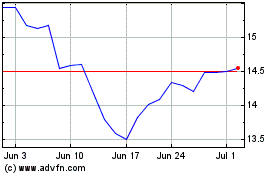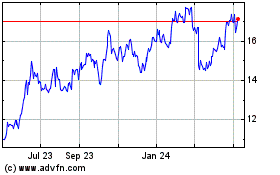Brazil's Vale Will Draw $3 Billion From Credit Lines -- Update
January 12 2016 - 2:17PM
Dow Jones News
By Paul Kiernan
RIO DE JANEIRO--Brazilian mining giant Vale said Tuesday it will
draw $3 billion from revolving credit lines to help pay off bonds
due this month in what analysts described as a possible last-ditch
move to shore up its finances.
Like other resource companies, Vale has been punished by a year
of deeply depressed prices for iron ore and other commodities. But
it faces the additional stigma of being Brazilian at a time when
international capital markets have largely shunned the South
American country's assets amid a wide-reaching corruption scandal
at state-run oil company Petróleo Brasileiro SA and an economic
crisis. A major accident at Samarco Mineração SA, Vale's local
joint mining venture with Australian miner BHP Billiton Ltd., on
Nov. 5 has further rattled investors.
Faced with so many headwinds, Vale has become a pariah in global
debt markets. Its 4.38% notes due in 2022 have fallen as low as
72.55 cents on the dollar in recent weeks, following a steep
selloff in the wake of the Samarco disaster.
The situation marks a stunning turnaround from just a couple of
years ago, when Vale was viewed as perhaps Brazil's most
creditworthy company. It boasted an A- credit rating from Standard
& Poor's and was the world's second-largest mining firm by
market capitalization. Though Vale has yet to lose investment-grade
status, all three major ratings firms have negative outlooks on the
company.
But investors aren't waiting around. Klaus Spielkamp, a bond
analyst in Miami at Latin America-focused brokerage Bulltick
Capital Markets, says all but his most aggressive clients have
stopped trading Vale, along with other Brazilian companies.
"Nobody knows for sure if [Samarco] is going to be high-cost for
Vale or not, and they don't get the benefit of the doubt because of
Brazil," Mr. Spielkamp said. "It doesn't bode well for them to be
using this line."
Vale and BHP Billiton have denied any responsibility for the
Samarco accident, which killed 19 people and polluted more than 400
miles of rivers when a tailings dam burst. But Brazilian
authorities included the parent companies in a $5 billion lawsuit
against Samarco in response to the disaster, saying they will be on
the hook if Samarco can't pay the cleanup costs.
Vale said its use of the credit line will "increase liquidity
and bridge potential cash flow needs" as it aims to finish a number
of costly projects. Chief among them is S11D, a $16 billion
supermine in the Brazilian Amazon that will allow Vale, already the
world's largest iron-ore producer, to increase its output of the
commodity by more than 25%.
The iron-ore market, however, has plumbed depths that were
unthinkable to most big mining companies 18 months ago. Benchmark
iron-ore prices, which approached $200 per metric ton in 2011 and
remained above $100 a ton during much of 2014, have recently fallen
below $40.
Vale said delays in its divestment program, which has dragged
out as the commodity downturn reduced the market value of mining
assets, also motivated its use of the revolving credit line.
Specifically, Vale mentioned the sale of a stake in its Mozambique
coal operations to Japan's Mitsui & Co. that it has been trying
to close since late 2014.
"Some of the amount raised will cover the funds used to amortize
bonds due in January 2016," Vale added.
Write to Paul Kiernan at paul.kiernan@wsj.com
(END) Dow Jones Newswires
January 12, 2016 14:02 ET (19:02 GMT)
Copyright (c) 2016 Dow Jones & Company, Inc.
Petroleo Brasileiro ADR (NYSE:PBR)
Historical Stock Chart
From Mar 2024 to Apr 2024

Petroleo Brasileiro ADR (NYSE:PBR)
Historical Stock Chart
From Apr 2023 to Apr 2024
